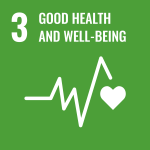Goal 3: Good Health and Well-Being
ENSURE HEALTHY LIVES AND PROMOTE WELL-BEING FOR ALL AT ALL AGES
Research

Dr. Yonah Amster, Head of the Department of Environmental and Occupational Health at the School of Public Health and the Faculty of Social Welfare and Health Sciences, has been advising the World Health Organization (WHO) on occupational health issues related to COVID-19. Dr. Amster’s work at the WHO focuses on producing policy and technical briefs on how to prevent and mitigate the spread of COVID-19 in the workplace, as well as how to stay healthy during workplace closures and while teleworking.
COVID-19 laid bare many long- standing problems with healthcare systems around the world. Overstretched healthcare workers in hard-hit countries struggled with long working hours, fatigue, and extreme psychological stress. A new study led by Dr. Talya Greene documents the especially high toll that COVID-19 took on healthcare staff in the United Kingdom.
Thanks to CAPABLE, an AI application being developed by Prof. Mor Peleg, from the Herta and Paul Amir Faculty of Social Sciences and head of the Data Science Research Center, in collaboration with Prof. Silvana Quaglini, patients with kidney cancer and diabetes can now manage their care at home. CAPABLE monitors the patient’s physiological symptoms, collating, analyzing, and cross-referencing the personal medical data with a growing database of medical guidelines and intervention strategies.
Public Engagement
As part of the Faculty of Social Welfare and Health Sciences, the Department for Community Mental Health’s primary aim is to build bridges between science and practice, encourage dialogue and collaboration between national and international mental health experts, and develop adaptable policy papers.
The UNESCO Chair in Bioethics at University of Haifa brings together a global network of institutes for medical ethics training in developed and developing countries, and helps create up-to-date syllabi for medical ethics education, based on the requirements of medical schools around the world.
Through mobilizing the health outreach programs that service the local community, the Interdisciplinary Clinical Center (ICC) meets health, developmental, emotional, and social needs of the community, and conducts community interventions during emergencies. The ICC provides assessment, therapy and supervision, and organizes workshops for people of all ages and mother tongues both on university premises and in the community.
Learning & Students
Advancing Israel’s Neurotech field one synapse at a time, Brainstorm IL is a cross-university student-led community for applied neuroscience. As part of this initiative, the BCI4AlS academic course teaches the theory and practice of brain-computer interfaces (BCI). Led by PhD candidate Or Rabani, an interdisciplinary group of students enrolled in BCI4ALS, together with Haifa Innovation Labs, are working to develop innovative solutions for patients of Amyotrophic Lateral Sclerosis (ALS).
Aviv Kushnir, a recent graduate of the Masters in Art Therapy program, has developed APPlicodrama: an AI-based software application rooted in psychodrama methodology. His innovative solution provides patients with a hybrid traditional/ digital therapy platform for better monitoring, support, and treatment. Aviv is the winner of Israel’s Council for Higher Education competition for student entrepreneurs. Aviv and his team have joined an acceleration program and are now looking to pilot at a medical facility.
The university’s Psychological Counseling Unit provides a variety of subsidized therapies for students and staff to help them cope with emotional difficulties and stress connected to academic and personal issues. The service is free for students with financial difficulties.
Operations
The university shares its sports facilities with the local community by allowing access to its volleyball, football, basketball, tennis, and squash courts, as well as to its fitness center. The center offers a squash program for children ages 11-14, who complete their homework with student volunteers after their squash lessons.
Our smoke-free policy prohibits smoking in public places.
Smoking is only permitted in a few designated areas, which are clearly marked around the campus.


